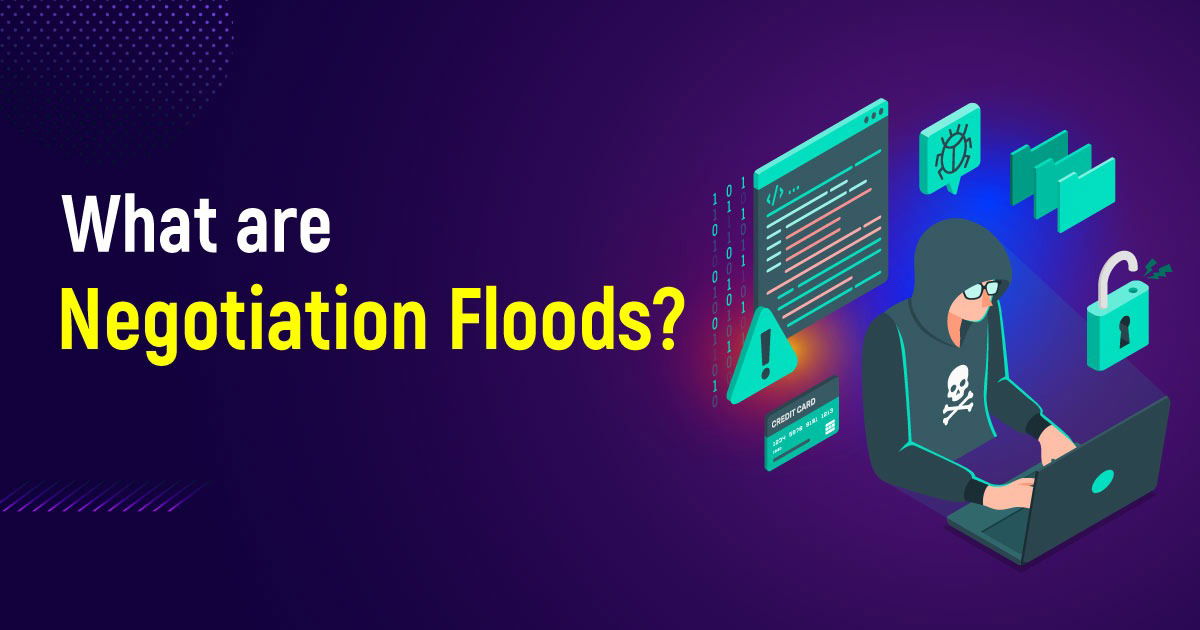Negotiation Floods are a type of DDoS attack that exploits network protocols’ negotiation processes to overwhelm network resources. The attacker floods the network with an excessive number of protocol negotiation requests, exhausting the available resources and rendering the network unresponsive to legitimate traffic.
How Do Negotiation Floods Work?
Attackers leverage vulnerabilities in network protocols that involve negotiation processes, such as TCP, HTTP, or SIP. They initiate a massive influx of negotiation requests, aiming to deplete the network’s capacity to handle these requests. By overwhelming the network infrastructure, Negotiation Floods disrupt communication channels and impede normal network operations.
Impacts of Negotiation Floods
Network Congestion and Slow Performance:
Negotiation Floods saturate network resources, causing congestion and severely impacting network performance. The excessive negotiation requests consume bandwidth, leading to slow response times, delays, and potential service disruptions.
Service Unavailability and Downtime:
As Negotiation Floods intensify, the targeted network may become overwhelmed, resulting in service unavailability and extended downtime. This disrupts critical operations, impairs productivity, and can have severe financial consequences for organizations.
Resource Exhaustion and System Crashes:
The continuous influx of negotiation requests exhausts network resources, such as CPU, memory, or connection limits. This can lead to system crashes, rendering the network or specific services inaccessible and requiring time-consuming recovery procedures.
Mitigating Negotiation Floods
Intrusion Detection and Prevention Systems (IDPS):
Implement robust IDPS solutions that can detect and block malicious negotiation requests. These systems analyze network traffic, detect abnormal patterns associated with Negotiation Floods, and apply countermeasures to mitigate the impact of the attack.
Traffic Monitoring and Filtering:
Deploy network traffic monitoring tools to identify unusual negotiation request patterns. Employ traffic filtering mechanisms, such as access control lists or firewalls, to block suspicious requests and prevent them from overwhelming network resources.
Rate Limiting and Connection Throttling:
Implement rate limiting mechanisms and connection throttling techniques to restrict the number of negotiation requests allowed from a single source. This helps mitigate the impact of Negotiation Floods by limiting the resources consumed by malicious actors.
Protocol Hardening and Patch Management:
Regularly update and patch network protocols and their implementations to address known vulnerabilities. Follow industry best practices for protocol hardening, disabling unnecessary features, and implementing secure configurations to minimize the attack surface.
What are some Network Infrastructure Enhancements that can be undertaken?

Scalable Network Architecture:
Design network infrastructure with scalability in mind, ensuring it can handle increased traffic during peak periods or in the face of DDoS attacks. Employ load balancing techniques and distribute network resources effectively to reduce the impact of Negotiation Floods.
Redundancy and Failover Mechanisms:
Implement redundant network components and failover mechanisms to ensure continuous service availability. Redundancy helps distribute the load and ensures that if one network element becomes overwhelmed, others can step in and maintain network operations.
Anomaly Detection and Behavior Analysis:
Deploy advanced anomaly detection systems and behavior analysis tools to identify abnormal negotiation request patterns. These solutions use machine learning algorithms to detect and flag suspicious network activity, allowing for proactive response and mitigation.
Conclusion
Negotiation Floods pose a significant threat to network infrastructure, overwhelming resources and causing service disruptions. By understanding the mechanics of these attacks and implementing robust mitigation strategies, organizations can safeguard their networks. Intrusion detection systems, traffic filtering, protocol hardening, and network enhancements are crucial in mitigating the impact of Negotiation Floods, preserving network availability, and ensuring uninterrupted services. Stay vigilant, keep protocols updated, and be prepared to combat this attack on network resources.








